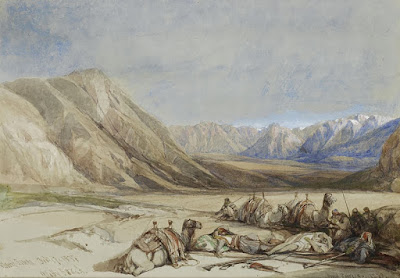You may subscribe yourself at the Ascension site here and receive notifications in your email, or just follow along on my blog. Bible in One Year Readings Index
Day 40: Laws of Justice
Agape Bible Study
Themes will frame forty-two covenant judgments in Exodus 21:1-23:12, providing a prologue and an epilog to the forty-two judgments:
| Idolatry prohibition and proper forms of worship Ex 20:22-26 | 42 judgments Ex 21:1-23:12 | Idolatry prohibition and proper forms of worship Ex 23:13-19 |
Forty-two is a number associated with trial and judgment in the Book of Revelation. The forty-two judgments in Exodus 21:1-23:12 are meant to test Israel's obedience and to make Israel sensitive to sin. The judgments are listed in the next three chapters and contain the first body of the Torah legislation known as sefer ha-berit ("Book of the Covenant"). It is a title based on Exodus 24:4-7 which records that Moses put the divine commands into writing and then read the covenant document aloud to the people in the ratification ceremony.
- Exodus 21:2-22:16/17: Relates to civil and criminal matters. These laws are not presented as abstract legal principles but as specific rulings on hypothetical cases whose rulings are to be the jurisdiction of the courts. An important addition is the statement of imposed punishments equal to the damage caused.
+++
A Daily Defense
Day 40 Four Hundred Silent Years?
CHALLENGE: “The deuterocanonicals are not genuine Scripture. There was a period of 400 ‘silent years’ between Malachi and the New Testament when God didn’t give any prophetic word. The deuterocanonicals even refer to ‘the time that prophets ceased to appear’ (1 Macc. 9:27).”
DEFENSE: The lull in prophetic activity is no indicator of whether books from this period are genuine Scripture. First, the lull that 1 Maccabees refers to was temporary. Even the people living then expected new prophets to appear (1 Macc. 4:46, 14:41).
Second, there have been other lulls in prophetic activity; this was not the first. Similar ones are referred to in 1 Samuel 3:1 (during Samuel’s boyhood, “the word of the Lord was rare in those days; there was no frequent vision”), Psalm 74:9 (“there is no longer any prophet”), and Lamentations 2:9 (Zion’s “prophets obtain no vision from the Lord”).
Third, the lulls were not total. Thus during the time of Samuel’s boyhood, visions were rare, not non-existent. In the period before the writing of the New Testament, Anna served as a prophetess, and Simeon, Zechariah, Mary, and Joseph had revelations (Luke 2:36, 2:25–26, 1:11–20, 26–37; Matt. 1:20–23, 2:13, 19–20). There may not have been major prophets, but there were ongoing visions and revelations, including during the period of the Maccabees (2 Macc. 3:24–28, 5:2–4, 15:12–16).
Fourth, these lulls did not prevent the writing of Scripture about or during them. If they prevented the writing of Scripture about them, then 1 Samuel would not be Scripture, and if it prevented the writing of Scripture during them, then Psalm 74 and Lamentations would not be Scripture.
The view that the non-unique lull during the time of the Maccabees prevented Scripture from being written about or during this period is false. It is based on a misunderstanding of the connection between prophets and the writing of Scripture. Although all authors of Scripture are vessels of divine inspiration, they are not all individuals who function professionally as prophets, like Isaiah, Daniel, or Hosea. Thus, a lull in prophetic activity cannot be read as a cessation of Scripture writing. If it did, then parts of the canon that all Christians and Jews accept would have to be struck.
Jimmy Akin, A Daily Defense: 365 Days (Plus One) to Becoming a Better Apologist

No comments:
Post a Comment